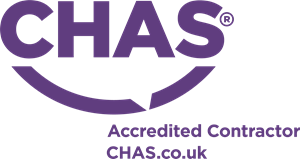Timber Frame Finance Warranties and Accreditations
 The Structural Timber Association (STA) represents the vast majority of the structural timber industry, with an extensive membership covering a range of businesses engaged in the delivery of structural timber buildings. This includes the materials supply chain, engineers, designers, manufacturers, erector/installers and associated firms providing support services, such as legal and insurance businesses.
The Structural Timber Association (STA) represents the vast majority of the structural timber industry, with an extensive membership covering a range of businesses engaged in the delivery of structural timber buildings. This includes the materials supply chain, engineers, designers, manufacturers, erector/installers and associated firms providing support services, such as legal and insurance businesses.
The STA offers differing levels of membership, each requiring defined levels of quality in the way the members undertake their work. However, the extensive range of membership businesses means that the specific quality requirements differ for each type of member and customer activity.
The STA stringently audit their members annually based on set criteria.
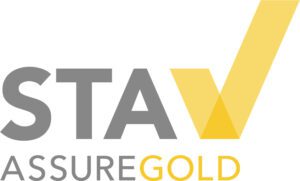 Choosing to work with a STA member company gives you the confidence that no matter what service they are providing, they are meeting the STA’s membership criteria.
Choosing to work with a STA member company gives you the confidence that no matter what service they are providing, they are meeting the STA’s membership criteria.
They will also have the necessary accreditation to comply with the Construction Products Regulations (CPR) and CE marking, where applicable.
There is always a commercial decision to adopt increasingly recognised accreditations and standards. The STA guides its members to achieve the highest levels of quality and performance across a range of industry standards.
STA Membership Types and Levels
There are different types of membership, these are show below.
Structural Timber Building System (STBS) members
Product Supply Chain members
Erector/Installer members
Designers and Engineers
The STA has established three levels of membership; Gold, Silver and Bronze. The levels of membership are designed to recognise the differing levels of standards held by the members based on audited performance. Certification
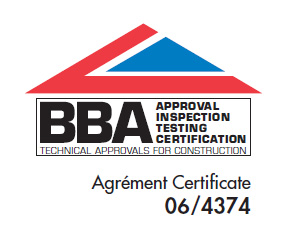 A BBA certificate, also known as a British Board of Agrément certificate, is a document issued by the British Board of Agrément (BBA). The BBA is a leading UK body that assesses, tests, and certifies construction products, systems, and processes to ensure their compliance with industry standards and regulations. The primary purpose of a BBA certificate is to provide independent verification and assurance regarding the performance, safety, and suitability of construction products and systems.
A BBA certificate, also known as a British Board of Agrément certificate, is a document issued by the British Board of Agrément (BBA). The BBA is a leading UK body that assesses, tests, and certifies construction products, systems, and processes to ensure their compliance with industry standards and regulations. The primary purpose of a BBA certificate is to provide independent verification and assurance regarding the performance, safety, and suitability of construction products and systems.
Here are some key points about BBA certificates:
- Product Evaluation: BBA certificates are typically issued after a thorough evaluation of construction products, systems, or processes. This evaluation includes laboratory testing, on-site inspections, and an assessment of technical specifications and performance data.
- Quality Assurance: The BBA is recognized for its commitment to maintaining high standards in the construction industry. A BBA certificate signifies that a product or system has met these rigorous quality and performance criteria.
- Third-Party Certification: BBA certificates are considered third-party certifications, meaning they are issued by an independent organization separate from the manufacturer or supplier. This impartiality enhances the credibility of the certificate.
- Technical Guidance: BBA certificates often include technical guidance and information about the product or system’s performance characteristics, installation requirements, and recommended applications.
- Building Regulation Compliance: BBA certificates may be used to demonstrate compliance with UK building regulations. They can be particularly valuable when seeking approval for non-traditional or innovative construction methods or materials.
- Market Acceptance: BBA certification provides market acceptance and credibility among architects, builders, contractors, and regulators.
- Renewal and Monitoring: BBA certificates are typically valid for a specified period, after which they may require renewal through reassessment and testing. This ensures that the product or system continues to meet industry standards.
- Multiple Sectors: BBA certificates cover a wide range of construction sectors, including roofing, insulation, cladding, windows, doors, and more importantly SIPs!! Hemsec BBA Certificate
- Consumer Confidence: BBA certificates provide consumers and end-users with confidence that the products or systems they are purchasing have been independently evaluated and are fit for purpose.
If a product or system doesn’t have a BBA certificate it may be appropriate to ask the question why not? It is a costly and involved process to acquire a BBA certificate and is advantageous to all manufacturers of products to acquire these.
From a SIPs perspective this should be a prerequisite when looking to confirm your SIP provider as BBA 3rd party accreditation provides confirmation of product quality whilst also helping to satisfy mortgage lenders and warranty providers. Its is a document that will be asked for!!
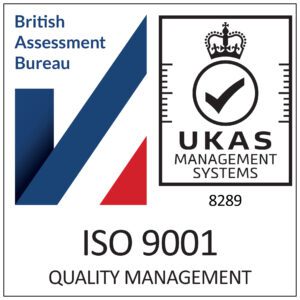 ISO 9001:2015 is an international standard that outlines the requirements for a quality management system (QMS). It provides a model to set up an effective QMS aligned with the organization’s overall business strategy.
ISO 9001:2015 is an international standard that outlines the requirements for a quality management system (QMS). It provides a model to set up an effective QMS aligned with the organization’s overall business strategy.
The standard covers various aspects of quality management, including leadership, planning, support, operations, performance evaluation, and improvement. The key principles of ISO 9001:2015 are:
- Customer focus
- Leadership
- Engagement of people
- Process approach
- Improvement
- Evidence-based decision making
- Relationship management
This standard is applicable to any organization, regardless of size or industry. It requires organizations to identify and manage the processes needed to deliver products and services that meet customer requirements and applicable regulations. ISO 9001:2015 certification demonstrates an organization’s commitment to quality, customer satisfaction, and sound internal management practices. It has been adopted by over 1 million organizations in over 170 countries.
Benefits of ISO 9001:2015 Certification
ISO 9001:2015 provides a framework for building an effective quality management system, with benefits including:
- Improved efficiency: Focuses on improving processes, reducing bureaucracy, and continuously improving the system, leading to increased efficiency and productivity.
- Reduced waste: Clear documented processes reduce errors and defects, decreasing rework and wasted resources.
- Consistent outcomes: Standardized processes with measures and controls in place lead to predictable, consistent results, giving customers confidence in the organization’s ability to deliver quality.
By implementing ISO 9001:2015, organizations can improve operations, satisfy customers, and outperform competitors. The standard drives performance excellence.
CHAS (Contractors Health and Safety Assessment Scheme) is an accreditation scheme for contractors in the UK, launched in 1997 by the Government’s Health and Safety Executive (HSE) to improve health and safety standards and compliance.
To become CHAS accredited, a business must undergo a detailed assessment of their health and safety policies, risk assessments, method statements, training records, and general health and safety documentation. This assessment ensures that the business meets industry standards and has suitable health and safety systems in place.
CHAS accreditation must be renewed annually, ensuring contractors maintain their health and safety standards. It provides assurance to clients that the contractor meets the necessary requirements.
Many public sector organizations and large corporations require CHAS accreditation from their contractors. It has become an important accreditation for demonstrating health and safety competence and a positive safety culture.
Benefits of CHAS Certification
CHAS (Contractors Health and Safety Assessment Scheme) certification demonstrates a contractor’s commitment to health and safety best practices, offering several benefits:
- Compliance: It verifies compliance with health and safety legislation and industry standards, demonstrating suitable health and safety policies and risk management procedures.
- Risk reduction: Assessments help clients pre-qualify suppliers and certify contractors’ competency in managing safety, reducing health and safety risks.
- Efficient pre-qualification: CHAS certification shows that contractors have passed independent verification of their health and safety processes and standards, streamlining the pre-qualification process.
Working with a CHAS certified contractor ensures proper health and safety processes, pre-qualified work, and risk reduction.
SMAS (Safety Management Advisory Services) certification is an accreditation for contractors working with local authorities and housing associations, demonstrating their commitment to health and safety best practices.
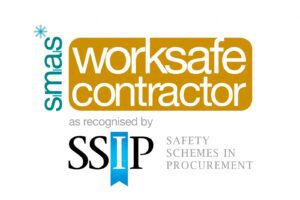 To achieve SMAS certification, a business undergoes an assessment of its health and safety management systems, covering risk assessment, training, accident reporting, and more. Certification shows compliance with legislation and industry safety guidance.
To achieve SMAS certification, a business undergoes an assessment of its health and safety management systems, covering risk assessment, training, accident reporting, and more. Certification shows compliance with legislation and industry safety guidance.
The assessment is conducted by SMAS Worksafe or another accredited body, resulting in a pass or fail for the contractor. Certified contractors must pass regular reassessments to maintain certification.
Local authorities and housing associations often require SMAS certification before awarding work, providing assurance of safe operations and risk management.
Benefits of SMAS Certification
SMAS certification offers key benefits for contractors and their clients:
- Compliance: Demonstrates adherence to health and safety legislation and industry standards, assuring clients that safety best practices are followed.
- Pre-qualification: Acts as a pre-qualification for public sector construction and facilities management contracts, expanding bidding opportunities.
- Access to contracts: Recognized by major private sector clients, meeting their minimum standards for contractor health and safety compliance.
SMAS certification showcases a contractor’s commitment to safety, risk management, compliance, and opens opportunities for bidding on contracts.

